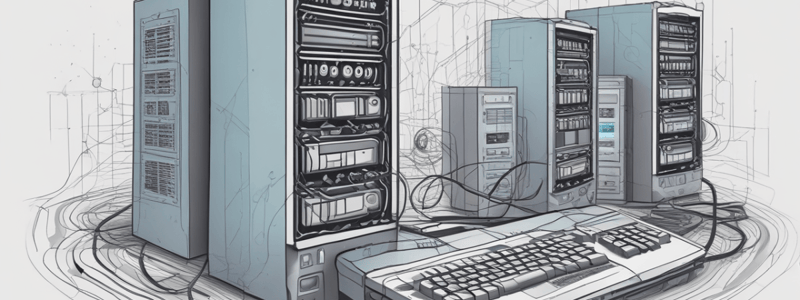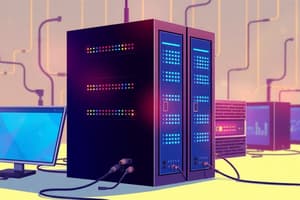Podcast
Questions and Answers
What type of modem connects to an Internet Service Provider (ISP)?
What type of modem connects to an Internet Service Provider (ISP)?
- Cable modem or DSL modem (correct)
- Core Internet backbone router
- Enterprise-level router
- Client modem
What is the primary function of an enterprise-level router?
What is the primary function of an enterprise-level router?
- To connect devices using WiFi
- To connect an ISP to the core Internet backbone routers (correct)
- To store messages on a server
- To process requests to send/retrieve messages
What is the main purpose of the Client/Server Model?
What is the main purpose of the Client/Server Model?
- To span across many differently located networks (correct)
- To separate tasks between routers and devices
- To connect hosts to the Internet
- To protect data from getting lost or corrupted
What is the primary function of a Network Interface Controller?
What is the primary function of a Network Interface Controller?
What is a client in the context of the Client/Server Model?
What is a client in the context of the Client/Server Model?
What is a host in the context of the Client/Server Model?
What is a host in the context of the Client/Server Model?
What is the main difference between a Router and a Repeater?
What is the main difference between a Router and a Repeater?
What is the primary function of a server in the Client/Server Model?
What is the primary function of a server in the Client/Server Model?
What is the purpose of an IP address?
What is the purpose of an IP address?
What is the function of a Modem?
What is the function of a Modem?
Why is it important to distinguish between a client and a host?
Why is it important to distinguish between a client and a host?
What is true about clients in the Client/Server Model?
What is true about clients in the Client/Server Model?
What is the Internet?
What is the Internet?
What is an example of a client in the context of email?
What is an example of a client in the context of email?
What is the primary function of a Router in a home network?
What is the primary function of a Router in a home network?
What is the main benefit of the Client/Server Model?
What is the main benefit of the Client/Server Model?
What is a Host in the context of computer networks?
What is a Host in the context of computer networks?
What is the process of finding a path from sender to receiver called?
What is the process of finding a path from sender to receiver called?
What is a Network Node?
What is a Network Node?
What is the main difference between an IP address and a domain name?
What is the main difference between an IP address and a domain name?
Flashcards are hidden until you start studying
Study Notes
Network Basics
- Network nodes are the building blocks of networks, and can vary in type and quantity of tasks they can perform.
- Examples of network nodes include:
- Network Interface Controllers (NICs): hardware that connects computers to network media via cables (e.g. Ethernet) or wireless transmission.
- Repeaters: hardware that receives network signals, clears out unnecessary noise, and resends the signal to make it more efficient.
- Routers: devices that forward packets of data between networks by processing the address.
- Modems: hardware that modulates digital network traffic to create wireless signals.
Basic Architecture
- A host is a computer or device connected to a network on the Internet.
- Examples of hosts include computers, printers, and smartphones.
- Each host has a unique Internet Protocol (IP) address, which is similar to a country's mail or postal system.
- IP addresses allow data to be sent to specific computers/devices, just like a house has its own street address.
- Hosts connect to the Internet through routers, which transmit data between networks within the Internet.
Routers
- Routers transmit data between different networks.
- Routing is the process of finding a path from sender to receiver.
- Home routers connect local devices to a cable modem, which provides the Internet connection.
- Cable modems or DSL modems connect to an Internet Service Provider (ISP), which connects to the core Internet backbone routers.
- Routers can use Ethernet or WiFi to connect to devices.
The Client/Server Model
- The Client/Server Model separates tasks/workloads between providers of a service (servers) and those requesting a service (clients).
- Servers store and process data, while clients access and request services from servers.
- Examples of clients include software on a host that accesses a service on a server, such as Gmail.
- A host can take on both server and client roles, and a server shares its resources with clients, but clients do not share their resources.
Studying That Suits You
Use AI to generate personalized quizzes and flashcards to suit your learning preferences.




